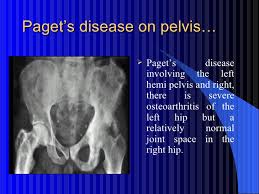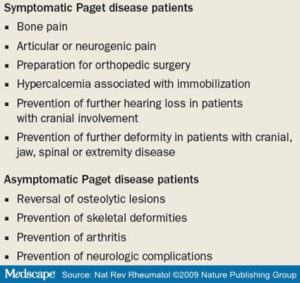Paget’s disease may lead to other medical conditions, including:
- Arthritis. Long bones in the leg may bow, distorting alignment and increasing pressure on nearby joints. In addition, pagetic bone may enlarge, causing joint surfaces to undergo excessive wear and tear. In these cases, pain may be caused by a combination of Paget’s disease and osteoarthritis.
- Hearing loss. Loss of hearing in one or both ears may occur when Paget’s disease affects the skull and the bone that surrounds the inner ear. Treating Paget’s disease may slow or stop hearing loss. Hearing aids also may help.
- Heart disease. In severe Paget’s disease, the heart works harder to pump blood to affected bones. This usually does not result in heart failure except in some people who also have hardening of the arteries.
- Kidney stones. Kidney stones are more common in patients with Paget’s disease.
- Nervous system problems. Pagetic bone can cause pressure on the brain, spinal cord, or nerves and reduced blood flow to the brain and spinal cord.
- Sarcoma. Rarely, Paget’s disease is associated with the development of a malignant tumor of the bone. When there is a sudden onset or worsening of pain, sarcoma should be considered.
- Loose teeth. When Paget’s disease affects the facial bones, the teeth may loosen. This may make chewing more difficult.
- Vision loss. Rarely, when the skull is involved, the nerves to the eye may be affected, causing some loss of vision.
Paget’s disease is not associated with osteoporosis. Although Paget’s disease and osteoporosis can occur in the same patient, they are completely different disorders. Despite their marked differences, several medications for Paget’s disease also are used to treat osteoporosis.
Who is the best in treating this condition?
The following types of medical specialists are generally knowledgeable about treating Paget’s disease:
- Endocrinologists. Doctors who specialize in hormonal and metabolic disorders
- Rheumatologists. Doctors who specialize in joint and muscle disorders
- Others. Orthopaedic surgeons, neurologists, and otolaryngologists (doctors who specialize in ear, nose, and throat disorders) may be called on to evaluate specialized symptoms.
How Paget’s is treated:
Drug therapy: The Food and Drug Administration has approved several medications to treat Paget’s disease. The medications work by controlling the excessive breakdown and formation of bone that occurs in the disease. The goal of treatment is to relieve bone pain and prevent progression of the disease. People with Paget’s disease should talk to their doctors about which medication is right for them. It is also important to get adequate calcium and vitamin D through diet and supplements as prescribed by your doctor, except for patients who have had kidney stones.
Bisphosphonates are a class of drugs used to treat a variety of bone diseases. Several bisphosphonates are currently available to treat Paget’s disease. Calcitonin is a naturally occurring hormone made by the thyroid gland. The medication may be appropriate for some patients.
Surgery: Medical therapy before surgery helps decrease bleeding and other complications. Patients who are having surgery should discuss pretreatment with their doctor. Surgery may be advised for three major complications of Paget’s disease:
- Fractures. Surgery may allow fractures to heal in better position.
- Severe degenerative arthritis. Hip or knee replacement may be considered if disability is severe and medication and physical therapy are no longer helpful.
- Bone deformity. Cutting and realigning pagetic bone (a procedure called an osteotomy) may reduce the pain in weight-bearing joints, especially the knees.
Complications resulting from enlargement of the skull or spine may injure the nervous system. However, most neurological symptoms, even those that are moderately severe, can be treated with medication and do not require neurosurgery.
Diet and exercise: There is no special diet to prevent or help treat Paget’s disease. However, according to the Institute of Medicine of the National Academy of Sciences, women age 50 and older and men age 70 and older should get 1,200 mg of calcium and at least 600 IU (International Units) of vitamin D every day to maintain a healthy skeleton. People age 70 and older need to increase their vitamin D intake to 800 IU. People with a history of kidney stones should discuss calcium and vitamin D intake with their doctor.
Exercise is important because it helps preserve skeletal health, prevent weight gain, and maintain joint mobility. Patients should discuss any new exercise program with their doctor before beginning, to avoid any undue stress on affected bones.

